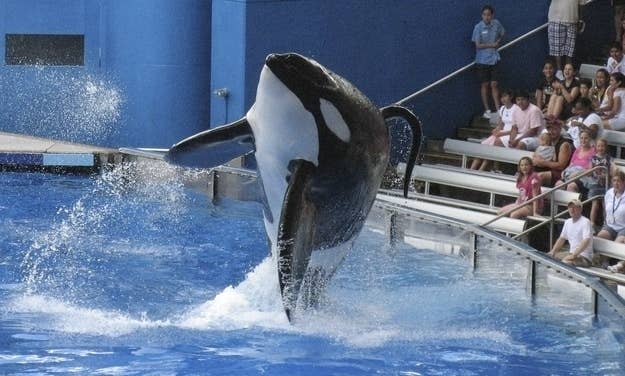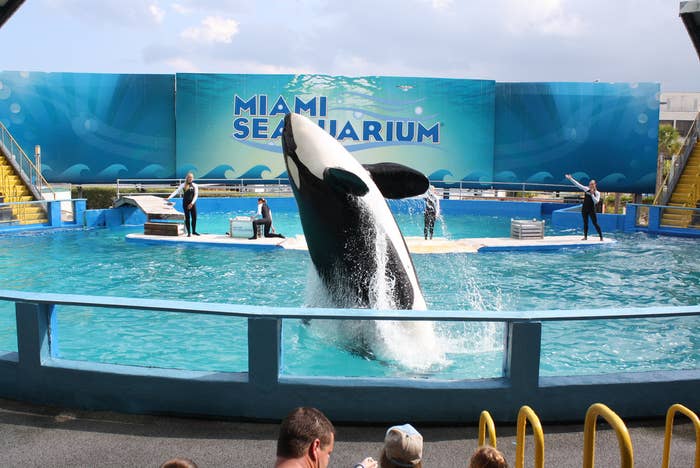
Fighting for the future of its signature killer-whale shows, SeaWorld returned to court Tuesday, reviving its three-year legal battle with the government that started after the death of a trainer in 2010.
In its case against the Occupational Safety and Health Administration, the marine entertainment titan hopes to overturn a federal ban on contact between whales and their trainers in front of a three-judge panel of the United States Court of Appeals in Washington, D.C.
Should the court uphold the ban once it makes its decision in the next few months, SeaWorld trainers will be prohibited from entering the water with whales during shows, eliminating the dives, jumps, and tricks that are arguably the most exciting parts of performances for audiences. Animal rights activists around the country hope to use leverage from the SeaWorld case to save the United States' only orca outside of SeaWorld at a park in Miami, filing a formal letter with OSHA earlier this month.
OSHA imposed the ban after the 12,000-pound bull orca Tilikum dragged veteran trainer Dawn Brancheau off a platform and underwater, killing her during a show at SeaWorld Orlando on Feb. 24, 2010. In August of that year, OSHA fined SeaWorld $75,000 and said that it "willfully violated" the general duty clause of the Occupational Safety and Health Act by exposing its trainers to danger when they interacted with killer whales during shows. "SeaWorld recognized the inherent risk of allowing trainers to interact with potentially dangerous animals," said OSHA regional administrator Cindy Coe in 2010. "Nonetheless, it required its employees to work within the pool walls, on ledges and on shelves where they were subject to dangerous behavior by the animals."
Occupational Safety and Health Review Commission administrative law Judge Ken Welsch upheld the original OSHA citations after a review in June 2012, though one was downgraded from "serious" to "willful," reducing SeaWorld's fine to $12,000 from the original $75,000. Though the OSHA citations were filed against SeaWorld Orlando, both SeaWorld San Antonio and SeaWorld San Diego have followed suit in avoiding direct contact between animals and trainers during performances.
SeaWorld looks to appeal Welsch's decision, calling OSHA's case "fundamentally misguided" in a 60-page opening appellate brief, Reuters reports. The organization says that the general duty clause, which requires an employer to provide its employees with a workplace "free from recognized hazards," was applied incorrectly in the original case, and that, "The clause is no more an instrument for supervising the interactions between whales and humans at SeaWorld, than it is a charter to prohibit blocking and tackling in the NFL or to post speed limits on the NASCAR circuit."
Eugene Scalia, son of Supreme Court Justice Antonin Scalia and former lawyer for the U.S. Department of Labor (which includes OSHA), represented SeaWorld in Tuesday's proceedings. The crux of SeaWorld's argument lies in its assertion that its parks offer "the public an opportunity to observe humans' interaction with killer whales," according to court documents:
This brings profound public educational benefit, is integral to SeaWorld's care of the whales, and responds to an elemental human desire to know, understand, and interact with the natural world. Interacting with nature is not without risk—not when mountain climbing or kayaking, not when sailing or swimming in the ocean, not when visiting our national parks. On rare occasions, killer whales can be dangerous. SeaWorld has taken extraordinary measures to control that risk. But it cannot eliminate it while facilitating the interaction between humans and whales that is integral to its mission.
In Scalia's oral argument in front of the court on Tuesday, he likened the park's orcas to a commodity of SeaWorld the business, and said that OSHA is trying to do something that is unprecedented in U.S. court decisions: "To tell a company that it cannot continue to offer the product that it had existed to offer to the public, it's as if the federal government came in and told the NFL that close contact on the football field would have to end because after all, more people are injured in the NFL on any given Sunday than were injured in the 22-year period that OSHA looked at in this case."
Apparently unconvinced by Scalia's logic, Chief Judge Merrick Garland asked, "If this was before 1943 when the NFL did not require helmets — and imagine that helmets were available — would that totally change the nature of the NFL to require helmets?"
During her argument, Department of Labor attorney Amy Tryon argued that the continued close contact between trainers and animals is not "inherent" to SeaWorld's business and would not devastate its profits, even though SeaWorld maintained in earlier documents that its "business model was premised on [this close contact]." Additionally, Tryon said, reiterating the testimony of an expert, no amount of training could completely prevent all hazards involving the whales: "SeaWorld's training program does not take the predatory instinct out of these animals."
A final decision on the SeaWorld v. OSHA is expected in the next few months, though the controversy doesn't end there.

With the growing buzz around the prizewinning documentary Blackfish, which was released in July but has instigated new levels of outrage with recent screenings on CNN, interest in the issue of keeping large cetaceans like orcas in captivity is seemingly at an all-time high. The documentary's two-hour premiere on CNN on Oct. 24, for example, ranked No. 1 in the 25–54 demographic in cable news. The premiere also attracted huge viewership among millennials, aged 18–34, averaging 688,000 viewers between 9 and 11 p.m. The day after the film's initial screening on CNN, Google searches for the term "blackfish" also jumped to their highest level, and since then have remained slightly higher — occasionally spiking, probably during subsequent screenings — than search levels in the preceding months.
And amid this recent fervor over the rights of cetaceans in captivity, SeaWorld is not the only North American marine park in hot water over its treatment of orcas. On Nov. 7, the nonprofit advocacy organization Animal Legal Defense Fund filed a formal letter with OSHA to enforce the safety standard to protect workers from a single captive orca at the Marine Exibition Corporation's Miami Seaquarium, which it says is the only marine park in the United States that is not fully complying with OSHA's general duty clause. The ban on whale–trainer contact during performances applies only to SeaWorld Orlando, though, as previously stated, the other SeaWorld parks in the U.S. have adopted it.
The orca, a 43-year-old female named Lolita, has been at the Seaquarium for over 30 years, and, of the 24 captive orcas in North America, is one of two killer whales used for performances outside of the three SeaWorld parks, according to OrcaHome.de, a database that tracks the orcas in captivity worldwide. The other orca is a female named Kiska at Marineland Ontario in Niagara Falls, Canada, which is now closed for the winter but is known for its poor conditions, even among SeaWorld's staff. (In 2011, SeaWorld demanded the return of a young male orca from Marineland after he was loaned to the park for breeding purposes; the whale was returned to SeaWorld San Diego in November 2011 and remains there today.)
According to the letter, which the ALDF provided to BuzzFeed, OSHA has only enforced the general duty clause against SeaWorld of Florida, and "only then after a trainer there [Brancheau] was killed by an orca." The letter continues with ALDF asking OSHA to act sooner rather than later: "Rather than wait for the next fatality, OSHA should intervene now to ensure that workers in these facilities are provided the 'safe and healthful working conditions' promised by the [Occupational Safety and Health Act]."
Since 2011, the ALDF has also been involved in two separate lawsuits regarding the treatment of Lolita at the Miami Seaquarium. In a lawsuit that's been in review since January 2013, the ALDF has petitioned the National Marine Fisheries Service for excluding Lolita from protections granted through the Endangered Species Act because she is the only whale of her species left in captivity. She is a southern resident orca, a species that frequents the near-shore waters off the coast of Washington state and eats fish — as opposed to transient orcas that eat marine mammals and offshore orcas that eat sharks. The southern resident orcas, which are now down to about 85 animals between three pods, have had trouble recovering from widespread hunting throughout the '60s and '70s.
After it was listed as endangered in 2005, the species as a whole came under the protection of the ESA, though the act "exclude[s] any captive members [of the species] and their progenies as if there were more than one," said Jenni James, a legal fellow for ALDF. "As if there were more than just Lolita."
In an August 2012 suit filed jointly with People for the Ethical Treatment of Animals (PETA), ALDF entered into litigation against the U.S. Department of Agriculture for not revoking Seaquarium's license after what they saw as several violations of the Animal Welfare Act, including Lolita's status as the only captive animal of her species, her containment in a pool that is too small and does not meet the AWA's required minimum dimensions, and her inability to shade herself from sunlight.
James said that Seaquarium has mostly dismissed the suit's claims, arguing on one point that Lolita's captivity does not violate the AWA since she is kept with Pacific white-sided dolphins, and that qualifies as the companionship of biologically similar species. "The dolphins are about the same size as baby orcas, and these are not animals that would interact in the wild," James said. "It's definitely not the same thing."
There have been a series of motions to dismiss this suit from both sides, James said, though nothing final has been decided in the AWA case.
As for the recently filed letter, James said she doesn't even know if Seaquarium is aware that ALDF has contacted OSHA formally. "Seaquarium is acting as if the whole OSHA scandal is not going on. They have not taken their trainers out of the water with Lolita, even after the 2010 death of Dawn Brancheau." She said the park is exploiting the fact that the law only narrowly applies to SeaWorld Orlando.
"If Tilikum was unhappy and it made him deadly, there's no reason something similar couldn't happen at Seaquarium," James said. "It's been an unfortunate oversight of OSHA to only engage one of the three SeaWorld parks, when in so many ways the law has forgotten about Lolita."
A representative from the Conroy Martinez Group, which acts as Seaquarium's public relations agency, said the park has no statement regarding ALDF action at this time.
CORRECTION: Marineland Ontario is located in Niagara Falls, Canada. An earlier version of this story misstated its location.
